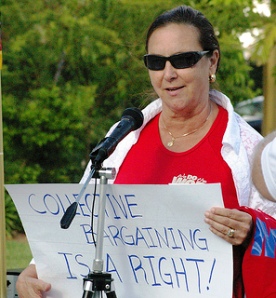Florida Supreme Court To Decide If State Must Repay $1 Billion In Pension Contributions
Do you have a right to pension benefits in a right-to-work state?
That’s one big question the state Supreme Court is facing in a lawsuit over the constitutionality of changing Florida’s pension requirements.
In 2011, lawmakers needed to plug a multi-billion budget hole and saw a chance to save the state almost a billion dollars a year.
The Legislature approved a law requiring state government employees to contribute three-percent of their salary into the Florida Retirement System.
The move affects more than half a million workers, including teachers.
Teacher unions say the move amounts to a 3-percent pay cut and the Florida Education Association (FEA) challenged the law.
Last spring, a Leon County Circuit judge agreed with the FEA that the law was unconstitutional because it changed the contracts of current employees and took away their collective bargaining rights.
Attorney Ron Meyer defended the ruling before the Florida Supreme Court Friday. He argued the contract should have changed only for employees hired after the law went into effect.
“You can’t change the game in the middle of the game, Your Honor,” said Meyer. “That’s an impairment of contract, and that’s proscribed by the Constitution.”
Justice Charles Canady countered that the state can choose to save money anytime by laying off employees.
“I have a hard time understanding how, when someone does not have a right, a continuing right to employment, they have a continuing right to a particular benefit of employment,” said Canady.
Former Justice Raoul Cantero argued on behalf of the state. He said the Legislature has the power to react to changing financial circumstances, like a massive budget deficit.
That prompted this exchange with Justice Peggy Quince:
“Did you say the Legislature could in fact eliminate the retirement program completely?” asked Quince.
“Going forward, constitutionally yes,” replied Cantero.
Quince continued, “So, that would mean also that the Legislature could in fact increase the employees’ contribution every year, couldn’t they?”
Cantero responded, “Theoretically yes, going forward, obviously not going backward.”
Until last year, state employees didn’t have to contribute any of their pay to the Florida Retirement System. The state covered the contributions for them.
Most employees in other states as well as the private sector are expected to contribute some of their own money to retirement plans in order to receive employer contributions.
Governor Rick Scott issued this statement about Friday’s hearing:
“This case is about our efforts to maintain a responsible and sustainable budget for the State of Florida…The legal question in the case is straightforward. The Legislature relied on and carefully followed a thirty-year-old Florida Supreme Court case, which held that the Legislature can change the public pension system on a going-forward basis. We therefore expect the Supreme Court to follow its own prior decision.”
If the state loses this case, it will have to reimburse almost a billion dollars to state employees, ranging from teachers to police officers.

